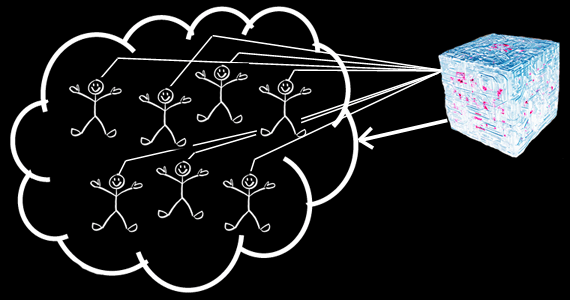Explaining Daryl Bem’s Precognition
January 16, 2011 3 Comments
Dr. Daryl Bem, Professor Emeritus of Psychology at Cornell University recently published an astounding paper in the Journal of Personality and Social Psychology called “Feeling the Future: Experimental Evidence for Anomalous Retroactive Influences on Cognition and Affect.” In plain English, he draws on the results of eight years of scientific research to prove that precognition exists. His research techniques utilized proven scientific methods, such as double blind studies. According to New Scientist magazine, in each case, he reversed the sequence of well-studied psychological phenomena, so that “the event generally interpreted as the cause happened after the tested behaviour rather than before it.” Across all of the studies, the probability of these results occurring by chance and not due to a real precognitive effect was calculated to be about 1 in 100 billion.
This little scientific tidbit went viral quickly with the Twitterverse and Reddit communities posting and blogging prolifically about it. We have to commend the courage that Dr. Bem had in submitting such an article and that the APA (American Psychological Association) had in accepting it for publication. Tenures, grants, and jobs have been lost for far less of an offense to the often closed-minded scientific/academic community. Hopefully, this will open doors to a greater acceptance of Dean Radin’s work on other so-called “paranormal” effects as well as Pim van Lommel’s research on Near Death Experiences.
More to the point, though, this has many scientists scratching their heads. What could it mean about our reality? Quantum physicists say that reality doesn’t really exist anyway, but most scientists from other fields have compartmentalized such ideas to a tiny corner of their awareness labelled “quantum effects that do not apply to the macroscopic world.” Guess what? There isn’t a line demarking quantum and macroscopic, so we need to face the facts. The world isn’t as it seems and Daryl Bern’s research is probably just the tip of the iceberg.
OK, what could explain this?
Conventional wisdom would have to conclude that we do not have free will. Let’s take a particular experiment to see why:
“In one experiment, students were shown a list of words and then asked to recall words from it, after which they were told to type words that were randomly selected from the same list. Spookily, the students were better at recalling words that they would later type.”
Therefore, if students could recall words better before the causative event even happened, then that seems to imply that they are not really in control of their choices, and hence have no free will.
However, our old friend Programmed Reality, again comes to the rescue and offers not one, not two, but three different explanations for these results. Imagine that our reality is generated by a computational mechanism, as shown in the figure below.
Part of what constitutes our reality would also be our bodies and our brain stuff – neurons, etc. In addition, assume that that “Computer” reads our consciousness as its input and makes decisions based both on the current state of reality, as well as the state of our consciousnesses. In such case, consider these three possible explanations:
1. Evidence is rewritten after the fact. In other words, after the students are told the words to type, the Program goes back and rewrites all records of the student’s guesses, so as to create the precognitive anomaly. Those records consist of the students and the experimenters memories, as well as any written or recorded artifacts. Since the Program is in control of all of these items, the complete record of the past can be changed, and no one would ever know.
2. The Program selects the randomly typed words to match the results, so as to generate the precognitive anomaly.
3. We live in an Observer-created reality and the entire sequence of events is either planned out or influenced by intent, and then just played out by the experimenter and students.
Mystery solved, Programmed Reality style.


Pingback: The Observer Effect and Entanglement are Practically Requirements of Programmed Reality « Musings on the Nature of Reality
Pingback: Explaining Daryl Bern's Precognition
Pingback: Quantum Retrocausality Explained | Musings on the Nature of Reality